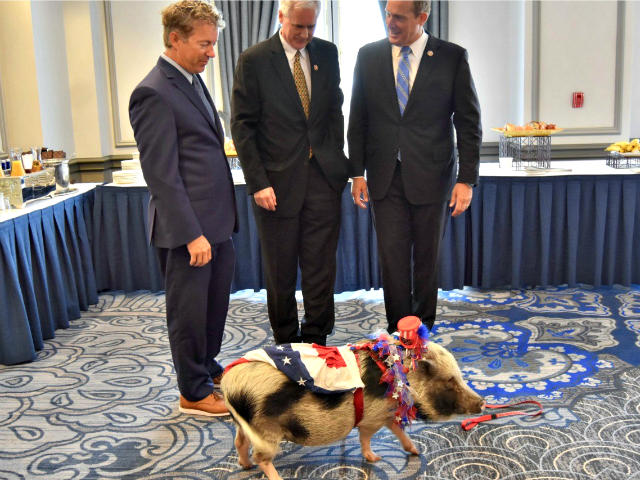Flanked by Republican lawmakers, Tom Schatz, president of Citizens Against Government Waste, unveiled the 27th edition of the Pig Book laying out how Congress approves billions of dollars in earmarks in government funding bills, including $9 million this year to quarantine fruit flies and almost $1 million to eradicate brown tree snakes in Guam.
“The 2019 pig book shows that Congress still has pork barrel fever and their only prescription has been more earmarks,” Schatz said. “Sadly, for the seventh time since Congress adopted an earmark moratorium in 2011, Citizens Against Government Waste has unearthed earmarks in the appropriations bills.”
The advocacy group undercover 282 earmarks in fiscal year 2019, adding up to a $15.3 billion cost to American taxpayers.
Those figures represent a 22 percent increase in earmarks over fiscal year 2018 when taxpayers funded 232 earmarks.
The report also noted: “The increase in pork-barrel spending occurs behind closed doors and hidden from taxpayers. There are no names of legislators attached to each earmark and limited information on where and how the money will be spent.”
Some examples of earmarks identified by CAGW include:
- $1.8 billion for seven earmarks for the F-35 Joint Strike Fighter, including eight additional planes for the Air Force, six for the Navy, and two for the Marine Corps. In development for nearly 18 years and eight years behind schedule, total acquisition costs now exceed $428 billion, nearly double the initial estimate of $233 billion. A 2019 DOD Selected Acquisition Report noted that the F-35’s lifetime operation and maintenance costs will total approximately $1.2 trillion, the most expensive weapon system in U.S. history.
- $65 million for the Pacific Coastal Salmon Recovery Fund. For the third consecutive year, President Trump’s budget recommended eliminating its funding because it favors state, local, and/or industry interests, and are “not optimally targeted … favor certain species and geographic areas over others,” and do not direct funds to programs and projects that have “the greatest need or potential benefit.”
- $12 million for the aquatic plant control program (largest amount ever). Since FY 1994, aquatic plant control projects have been earmarked by Sen. Minority Leader Chuck Schumer (D-N.Y.), Sen. Patrick Leahy (D-Vt.), and then-Sen. Jeff Sessions (R-Ala.).
“This is crazy,” Sen. Rand Paul (R-KY) said after he and other members of Congress posed for a photo with Faye, a miniature pig dressed in red, white and blue who also attended the press conference.
Paul said that lawmakers trying to cut earmarks from the appropriation process dates back to Sen. William Proxmire (D-WI), who gave out a Golden Fleece award for the worst wasteful government spending in the 1970s, which included a $50,000 study to find out what makes people happy.
Paul said Congress should cut back on its funding oveall to end earmarks and other wasteful spending.
“The reason why we still have waste forty years after William Proxmire, 27 years after Citizens Against Government Waste were doing this — the reason we they still have waste is we keep giving the people wasting it more money,” Paul said. “Give them less money and they’ll waste less.”
Tim Burchett (R-TN) was more direct about where he thinks pork belongs.
“The only place pork is good is on ribs and on a bun,” Burchett said.
Schatz praised Senate Republicans at the press conference for introducing a motion last month to permanently ban earmarks.
“One of the best ways to clean up Washington’s addiction to waste is for Congress to enact a permanent, statutory ban on earmarks,” Schatz said.
Follow Penny Starr on Twitter

COMMENTS
Please let us know if you're having issues with commenting.